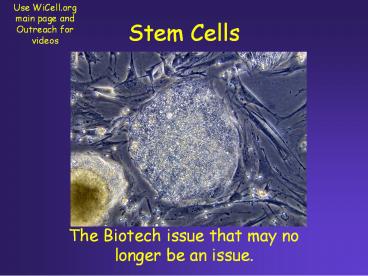Stem Cells PowerPoint PPT Presentation
Title: Stem Cells
1
Stem Cells
Use WiCell.org main page and Outreach for videos
- The Biotech issue that may no longer be an issue.
2
What are stem cells?
- Blank slate or unspecialized
- Under right conditions, can become any cell type
in our body.
3
Where do stem cells come from?
Two general sources
- Embryonic Stem Cells (ESC)
- Adult Stem Cells (ASC)
4
Human Development
Zygote fertilized egg
Cells divide. 5 6 days later, blastocyst
implants in uterine lining.
Cell division video internet link
Cell division video intranet link
5
Human Development
- Blastocyst has two parts trophoblast (will
become placenta) and inner cell mass (ICM) which
are embryonic stem cells (ESC) - Ready to implant in uterine lining
http//en.wikipedia.org/wiki/Blastocyst
stemcells.nih.gov/info/ scireport/appendixA.asp
6
Human Development
Totipotent Able to become all types of cells.
(Ex. zygote)
Pluripotent Able to become most types of cells.
(Ex. Inner Cell Mass can become
everything except placenta)
Multipotent Able to become some types of cells.
(Ex. Bone marrow cells can become different types
of white blood cells, but cannot become muscle or
nerve cells)
7
Human Development
Undifferentiated Have not decided to become a
type of cell yet. (Ex. Zygote)
Differentiate Decide to become a cell type.
Happens after blastocyst stage. (Ex. When placed
in a dish, ESCs will spontaneously differentiate
into . . . Video internet video - intranet)
8
Embryonic Stem Cells
What signals did they receive to become these
types?
If we can figure out how to cause the entire dish
of cells to become one type of cell . . .
9
Human Development
A model for understanding human organ and tissue
function and development
Prevention of birth defects and cell-based
diseases
10
Drug Screening
Trials conducted on pure populations of cells
in vitro, before administering them in vivo
11
Regenerative Medicine
Holy Grail
Human embryonic stem cells can provide a
potentially unlimited source of cells for
transplantation therapies
12
U.W. Researchers Dan Kaufman, M.D., Ph.D. and
Dong Chen, M.D., Ph.D.
Embryonic Stem Cells to Blood Cells
- Bone marrow transplants offer a cure for many
patients with leukemia, lymphoma, and multiple
myeloma. - Unfortunately, because of lack of appropriate
donors, only about one-third of patients who
require bone marrow from an unrelated, matched
donor can actually obtain a transplant.
13
Stem Cells to Neuronal Cells
Differentiate
Self-renew
UW Researchers Su-Chun Zhang, M.D., Ph.D Clive
Svendsen, Ph.D
Parkinsons disease is caused by the death of a
specific type of neuron (dopaminergic neurons).
1.5 million people affected in the U.S. Fetal
tissue transplants have been successful, but the
source of tissue is inadequate.
14
Pancreatic b-Cell Differentiation of ES Cells
Juvenile Onset Diabetes UW Researcher Jon
Odorico, M.D.
Juvenile onset diabetes is caused by the death of
specific pancreatic cells (islet b cells). 1
million people affected in the U.S. More than
15 of U.S.Health Care dollars are spent in
taking care of these patients. The
transplantation of pancreatic islet ? cells has
been successful, but the source of cells in
inadequate.
15
Stem Cells to Bone Cells
Differentiate
Self-renew
Bone
Cartilage
1. Post Menopausal Osteoporosis, Age-related
Osteoporosis 2. Sports Injuries 3. Joint
Replacements/ Surgical repair 4. Developmental
bone defects
16
Embryonic Stem Cells
All of this work requires being able to grow
ESCs without differentiating unless you tell
them to do so.
Dr. James Thomson discovered how to grow ESCs
without differentiation in 1998.
17
Where do ESCs come from?
Once ICM is removed, blastocyst is no longer
viable.
IVF in vitro fertilization
In 2004, 29 of embryos were destroyed while 41
were donated to ESC research.
Video internet video - intranet
18
ESCs limitations
Destruction of blastocyst - video
19
ESCs limitations
Destruction of blastocyst
Tissue is not yours which can lead to immune
system rejection
Solution? Therapeutic Cloning
Dedifferentiate return to an undecided or
undifferentated state.
20
Adult Stem Cells (ASC)
21
ASCs
All types are multipotent.
Sources
- Umbilical cord
- Bone marrow
- Adipose tissue (fat)
- skin
Stem Cell Summary Video Adult stem cells- 320
540
22
ASCs
- Uses
- Leukemia (bone marrow)
- Skin grafts
23
ASCs
- Limitations
- Multipotent
- Hard to find
24
iPS Cells
Sciencenow iPS Video Heart cells from skin cells
- Induced pluripotent stem cells
- 2007, Dr. James Thomson
- 4 genes added to differentiated cells (e.g. skin
cells) - Cells dedifferentiate and become stem cells
- No blastocyst is produced

